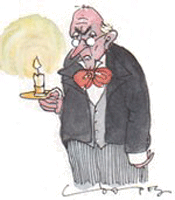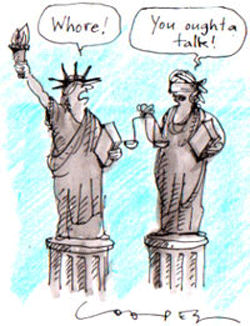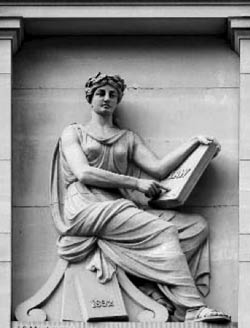The legal profession and the judges are superb at propaganda and the maintenance of a cartel ... Propagation of notions that bear no relationship to reality ... Should the statue of justice wear a blindfold or not? ... Take your pick ... Tulkinghorn reports
 As Evan Whitton writes in The Cartel:
As Evan Whitton writes in The Cartel:
"A cartel is a syndicate formed to prevent competition and to maximise benefits, including profits, via a monopoly."
Cartel conduct is illegal, both in the civil law and, since 2009, in the criminal law - and this applies to both individuals and corporations.
The legal profession is arguably Australia's most successful cartel. That doesn't mean that every lawyer earns more than he or she is worth, but it does mean mean that the upper echelons do, and that includes the judiciary.
For example, as Annette Marfording's report notes (see Tulkinghorn, September 24, 2010 and here:
"The annual salaries of NSW judges are between two and three times the maximum annual salaries of German Regional Court judges [and that] judicial officers in New South Wales enjoy about one and a half times more annual leave time than German judges."
The ideal cartel is beyond the reach of anti-cartel authorities, and this is where our legal cartel wins hands down.
Lawyers and judges have implemented a theory that they must be independent of everyone else, including anti-cartel authorities. It is claimed that this independence is necessary so that they can better protect our civil liberties.
Examples of judges and lawyers sacrificing themselves on the scaffold in defence of our civil liberties are historically rare, if not non-existent.
When things come to the crunch, the judges and upper echelons of the profession become poodles of the executive. Even the US Supreme Court finds and loses habeas corpus depending on which way the political wind is blowing. See here for a scholarly article that ...
"challenges the scholarly consensus that the Supreme Court's recent decisions invalidating the Bush Administration's treatment of detained suspected terrorists – Hamdi, Rasul, Hamdan, and Boumediene – signal a permanent judicial shift toward courageously protecting constitutional liberties during wartime."
Cartels (once they are known to exist) must engage in continual propaganda alleging that their cartel is in the public interest. Since that is untrue of the legal cartel, advocacy skills are called for, which barristers and judges possess in abundance.
In his article Ideology, Propaganda and Legal Discourse in the Argument Culture US law professor David Barnhizer contrasts university scholars, philosophers and scientists (whose respective disciplines seem to require objective truth seeking behaviour), with propagandists, polemicists and ideologues. He says:
"Legal scholars are an uncomfortable mixture of all these roles. Quite often legal scholars are less scholars as that is traditionally understood, but rhetoricians and advocates [and that] the problem with the advocate's focus is ... all advocacy involves an 'indifference to truth'."
In Justinian's Bar Talk of April 22 last year Sydney barrister Frank Stevens is quoted as saying that those who benefit from cartels, "are the least likely to provide the community with a light by which it can determine the manner in which they are deceived".
 The cartel's deceptions can be as subtle as "interpreting" what statues of justice mean.
The cartel's deceptions can be as subtle as "interpreting" what statues of justice mean.
According to the US Supreme Court website (see Figures of Justice):
"During the 16th century, Justice was often portrayed with a blindfold. The origin of the blindfold is unclear, but it seems to have been added to indicate the tolerance of, or ignorance to, abuse of the law by the judicial system."
The idea that the blindfolds are there so that our judges can pretend they don't know about all the dirty tricks that go on in front of them still reflects current realities, but it is a bit lacking in the public interest department, so it is perhaps not surprising that in March 2007 Queensland's chief legal propaganda officer (CLPO) did not advert to it when extensively explaining the statue of justice outside the Supreme Court in Brisbane.
There is a new explanation for the blindfold these days. As the US Supreme Court notes:
"Today, the blindfold is generally accepted as a symbol of impartiality, but may be used to signify these other traits in political cartoons."
In 2007 the Judicial Conference of Australia published a Guide to Sentencing.
 On page 18 there is a photo of a statue of justice at the Victorian Supreme Court. While justice is generally dispensed by men, the statue is of a woman who appears (as is usually the case) to be on the right side of forty.
On page 18 there is a photo of a statue of justice at the Victorian Supreme Court. While justice is generally dispensed by men, the statue is of a woman who appears (as is usually the case) to be on the right side of forty.
She is not blindfolded. She is holding a big book inscribed "LAW", and just in case people might not notice that, she is pointing at it as well. The inference (wrong though it is) is fairly clear. Judges always apply "law", and not their own personal preferences.
On February 18 this year the Queensland CLPO gave a speech propagandising for lawyers. He said:
"We may accept that people do not enter the legal profession for the purpose of amassing money by whatever means... There are people in the community with an unquenchable thirst for material wealth. Unfortunately they are often the least prepared to seek to understand, and certainly not accept, the ethical standards which constrain legal practitioners...
Bearing in mind that the membership of our profession in Queensland falls only a little short of 10,000, the comparatively small extent of ethical departure is reassuring... The peoples' confidence in the courts' adherence to the rule of law, and their delivery of justice according to law, has prevailed.
Queensland's CLPOTravelling around the State, I have not in recent years discerned any pervasive cynicism about the legal profession... The profession is seen to be fulfilling the charter laid out at admission – essentially, to serve the public with honesty and expertise."
A paper delivered to a Canberra conference in 2007 Professors Kathy Mack and Sharyn Roach Anleu say:
"In Australia, levels of confidence in the courts and the legal system are low. Almost half of the respondents (46.1 percent) to the AuSSA survey1 reported not very much confidence in the courts and the legal system and 22.2 percent expressed no confidence at all."
What other planet does the Queensland CLPO occupy?